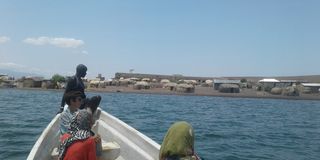Premium
El Molo in fear of losing ancestral land

Approaching El Molo village from the sacred island.
The El Molo, a minority community in Northern Kenya, is living in fear of eviction from their ancestral land to larger communities.
Members of the community in Marsabit County claim larger groups have over the years encroached on their land, and that they are being elbowed out.
The community, which lives on the eastern shores of Lake Turkana, laments it lacks representation in the county assembly, county government and national administration.
They want the Ministry of Lands and Physical Planning and the National Land Commission to help them register El Molo Bay sub-location as community land.
Mr Paul Lekapana says the community was not involved in meetings convened by the county government to take an inventory on community land for registration.
Mr Lekapana says they have presented a petition to Lands Cabinet Secretary Farida Karoney over the issue, exuding confidence that the land will be registered in accordance with the Community Lands Act of 2016.
According to the Kenya ethnic group population ranking in the 2019 census, the El Molo are the 42nd community, with 1,104 people.
“When the inventory was being drafted by the county government, we were never involved as a community and this means our concerns were not included accordingly,” Mr Lekanapa says.
“It is true that we are being consumed by other communities who have intruded into our land. Due to demographic disadvantage, we are facing extinction and not recognised in land ownership.”
He appealed to other stakeholders to intervene and help them register their land.
Mr Lekapana spoke on the sidelines of the National Summit on the Community Land Act (CLA) 2016 that ended in Nanyuki on Tuesday.
In the past five years, only 12 counties have submitted inventories of their respective unregistered community lands in readiness for the registration process as enshrined in the Law.
The ministry's Strategic Plan is to have all community land in 24 counties registered by 2024.
Ms Christiana Saiti, another resident of El Molo Bay, called on political parties to consider nominating their people to the Senate and the National Assembly so that they can participate in national decision-making.
“Our main problem is lack of political representation and it is unfortunate that our government has neglected us. We don’t have anyone working in government offices in Loiyangalani town, not even a messenger,” she said.
“The few elite politicians from other communities in Marsabit have been oppressing us and taking over our land to the extent that we might be extinct in the near future.”
She said the community opposes the Beach Management Units (BMUs) policy, claiming that it has allowed fishermen to invade their land without a managed fishing system.
“Traditionally, our main economic activity is fishing and we have lived on the eastern shores of Lake Turkana since time immemorial. BMUs in fisheries have made fishing free for all people,” she said.
“People pay Sh300 and are allowed to fish anywhere without regulations. They fish at our doorsteps but there is no law to protect us.”
Ms Saiti said her community had petitioned the county government, through the department of fisheries, to set up a regulated system of fishing but their grievances were not addressed.
“We are always ignored because we are a minority group. We don’t have the numbers, financial muscle and political representation to protect our rights. This is making us not to be recognised,” she said.
Lands Chief Administrative Secretary Alex Mburi has urged Parliament to enact legislation that will create an independent commission to deal with inter-county boundary conflicts.
The ministry argues that inter-county boundary disputes have over the years hampered the registration of community lands.
"MPs are obliged to enact some laws based on Chapter 188 of the Constitution. We are supposed to have an independent commission that deals with inter-county boundary disputes," Mr Mburi said.
The government intends to convert 347 group ranches into community lands in 12 counties.
The ministry - in partnership with the National Land Commission (NLC) and Food and Agriculture Organization (FAO), with funding from the European Union - is working with 24 county governments that have unregistered community land.
The summit was convened by the Indigenous Movement for Peace Advancement and Conflict Transformation (IMPACT), NLC, Pastoralists Alliance for Resilience and Adaptation in Northern rangelands (PARAN), Natural Justice, Kenya Land Alliance, and other key actors in the implementation of the CLA 2016.





